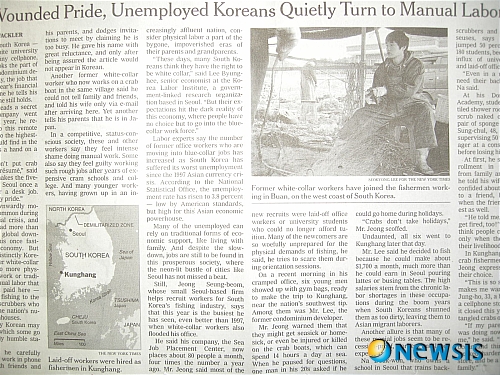- 어선조업후기
Home. 어선조업후기. 보도자료
`어장일꾼 언론보도`.....뉴욕 타임즈 (NYT 에서 방문 및 조업 보도
페이지 정보
본문
"뉴욕 타임즈"에 게제된 당사 `어장일꾼'
보도자료.
`어장일꾼' 사무실에서 상담과 채용 과정 및
이들의 고기잡이 조업 내용이 뉴욕에서 발간
미국의 일간신문 (뉴욕타임즈 NYT)가 보도.
0. 뉴욕타임즈의 취재 의도(목적)
-세계 경제 위기를 맞이하여 선진 외국의 많은 청,장년
실업자들이 일자리를 찾기 위하여 방황하고 있으나,
한국의 화이트 칼러 출신 청,장년들은 옛부터 한국에선
전통적으로 뱃일에 대한 부정적인 인식을 뒤로 미루고,
일자리를 찾아 생애 처음하는 뱃일을 선택하여 임시로,
서해 어장의 봄철 꽃게잡이에 나선 청,장년들이 재기의
위기 극복 희망 분투기를 미국의 저명 시사일간지
뉴욕 타임즈에서 보도.
이하 `어장일꾼' 관련 부분 발췌.
Labor experts say the number of former office workers
who are moving into blue-collar jobs has increased
as South Korea has suffered its worst unemployment
since the 1997 Asian currency crisis.
According to the National Statistical Office,
the unemployment rate has risen to 3.8
percent — low by American standards,
but high for this Asian economic powerhouse.
Many of the unemployed can rely on traditional forms
of economic support, like living with family.
And despite the slowdown, jobs are still to be found
in this prosperous society, where the neon-lit bustle
of cities like Seoul has not missed a beat.
Still, Jeong Seung-beom,
whose small Seoul-based firm helps recruit workers
for South Koreas fishing ndustry, says
that this year is the busiest he has seen,
even better than 1997, when white-collar workers
also flooded his office.
He said his company, the Sea Job Placement Center,
now places about 80 people a month, four times
the number a year ago.
Mr. Jeong said most of the new recruits were laid-off
office workers or university students who could no
longer afford tuition.
Many of the newcomers are so woefully unprepared
for the physical demands of fishing, he said,
he tries to scare them during olientation sessions.
On a recent morning in his cramped office,
six young men showed up with gym bags,
ready to make the trip to Kunghang,
near the nation’s southwest tip.
Among them was Mr. Lee, the former condominium
developer.
Mr. Jeong warned them that they might get
seasick or homesick, or even be injured or killed
on the crab boats,
which can spend 14 hours a day at sea.
When he paused for questions,
one man in his 20s asked if he could go home
during holidays.
“Crabs don’t take holidays,”Mr. Jeong scoffed.
Undaunted, all six went to Kunghang later that day.
Mr. Lee said he decided to fish because he could make
about $1,700 a month, much more than he could earn
in Seoul pouring lattes or busing tables.
The high salaries stem from the chronic labor shortages
in these occupations during the boom years
when South Koreans shunned them as too dirty,
leaving them to Asian migrant laborers.
Another allure is that many of these menial jobs seem
to be recession-proof, workers and labor experts say.
In Kunghang, many of the new crab fishermen recruited by
Mr. Jeong expressed regrets about their choice.
“This is so smelly and dirty, it makes me want to vomit,
” Kwak Jung-ho, 33, a branch manager of a cellphone
store in Seoul before it closed this year,said
as he cut tangled crabs out of a net.
“If my parents knew what I was doing now,
they would pity me,” he said.
“Now, I look at the ocean and think,
I should have worked harder at the cellphone store,
and be a better man for my family.
” Another former white-collar worker who now works
on a crab boat in the same village said he could not
tell family and friends, and told his wife only via e-mail
after arriving here.
Yet another tells his parents that he is in Japan.
In a competitive, status-conscious society,
these and other workers say they feel intense
shame doing manual work.
Some also say they feel guilty working such rough jobs
after years of expensive cram schools and college.
And many younger workers, having grown up in
an increasingly affluent nation, consider physical labor
a part of the bygone, impoverished eras of their parents
and grandparents.
“These days, many South Koreans think they have
the right to be white collar,” said Lee Byung-hee,
senior economist at the Korea Labor Institute,
a government-linked research organization based in Seoul.
“ But their expectations hit the dark reality of this economy,
where people have no choice but to go into the blue-collar
work force....끝.
회사명 : 어장일꾼(어업인력채용 및 직업정보제공)
사업자 : 113-90-15800 구로(유료사업99-44호)
주소 : 서울구로구 구로4동 314~1번지 (극동상가202호)
대표번호 : (02) 838 ~ 6611웹사이트 : www.seajob.co.kr
-
- 다음글
- `어장일꾼 언론보도`.....한국일보 및 머니투데이 보도자료
- 11.02.21
댓글목록
등록된 댓글이 없습니다.
-


